Bucha, symbol of the horror of Ukraine war, tries to heal wounds: ‘We don’t want revenge, we want justice’
The city suffered 33 days of occupation in the early days of the invasion and was exposed to the cruelty of Russian troops
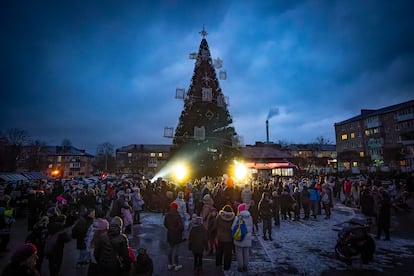

At the entrance to City Hall there is a miniature town made of gingerbread cookies next to a Christmas tree. “This year the big Christmas event is that we are celebrating it together with the rest of Europe, like last year, and not on the date that was imposed on us in Soviet times [January 7, the date of Christmas in Orthodox Christianity, which prevails in Russia],” says the mayor, Anatoly Fedoruk, with satisfaction, the day before Christmas Eve. About 30 kilometres (18.6 miles) from Kyiv, the town is striking because everything looks new, solid, in a country riddled by war. It looks like a town of middle-class families on the outskirts of any European capital. But it is Bucha, Ukraine, one of the symbols of the horror of the Russian invasion.
The atrocities suffered by the inhabitants during the 33 days of Russian occupation between February 26 and April 1, 2022 shocked the world. Yablonska Street was christened the Avenue of Corpses, because of the 78 bodies that lay in plain sight when the city was liberated. Their display was a warning and a threat to anyone who dared to leave the basements where the 2,300 remaining residents of the city’s 50,000 inhabitants were hiding: 509 were killed and 79 were kidnapped.
Today, some stretches of the long avenue have new pavement, repaired sidewalks, and newly installed signage. “It is very important to write a new page in our history; after psychological support, restoring and recovering the city is crucial,” says Fedoruk in his office. This is his goal, along with bringing the guilty parties to international justice so that they can be tried and punished for war crimes. “We don’t want revenge and hatred, we want justice,” he insists.
Bucha is marked by the stigma of having been the scene of horror. “We worked hard to explain that it is not the same place as in 2022. It is not a city that is suffering,” says Mikhailina Skoryk-Shkarivska, former deputy mayor and president of the Institute for Sustainable Community Development, an NGO working on the physical and emotional recovery of the municipality. The city and its surrounding area have recovered 95% of the 73,000 inhabitants who lived there before the invasion. “They are not necessarily the same ones,” explains Skoryk-Shkarivska. There are at least 12,000 new residents who have been internally displaced by the war.
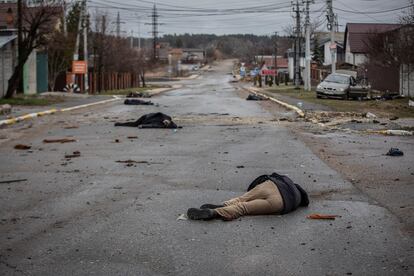
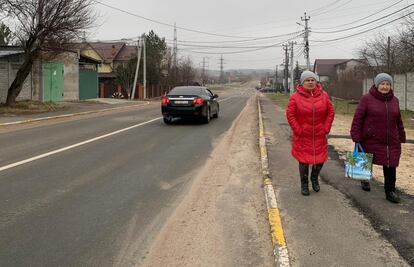
Anastasia Polyanska, director of the regional development agency, her husband, and her son are three of these new residents. They had decided to move to Bucha from Sumy, on the border with Russia, before the occupation. They were attracted by the forests, the kindergartens, and its proximity to Kyiv. The town is a mix of apartment blocks and single-family homes, surrounded by greenery. “After all the bad things that happened, what else can happen? That can’t happen twice,” she muses. The town frequently hosts visits from international delegations. She often tells them: “If you want to see war, go somewhere else.”
Despite the mayor and his team’s determination to start a new chapter and the resilience of the residents, no one forgets what happened here. Fedoruk, who stayed during the occupation — “I was elected in six elections, I couldn’t leave” — describes how he changed hiding places every day. “The Russians were on safari and, in that hunt, the mayor was the number one target,” he says. “Every cell in my body was focused on surviving; I couldn’t make any mistakes.”
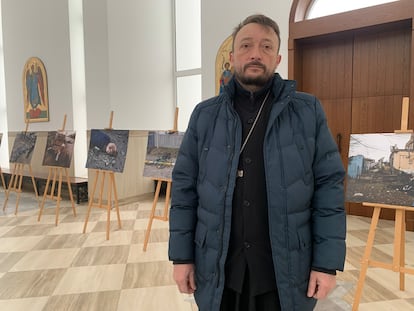
Father Andriy Halavin also stayed. He remembers the constant bombardment, the shaking ground, the battlefield that Bucha became. He points to shrapnel marks on the walls of the white church with its golden domes and two broken windows as a reminder. But what St. Andrew’s Church and its priest are known for is the mass grave he dug on the grounds during the occupation, after persuading the Russians to temporarily bury 116 dead. He transported them, with the help of residents, in shopping trolleys.
Inside the church, frozen in time, are the photographs that documented the barbarity. Halavin is impenetrable: “I cannot share my emotions from back then. If I let myself be carried away by them, I wouldn’t be able to live. I can share the facts,” he says, and shows a video of the church choir on his cell phone. He points to one of the singers, a young man. Then he shows a photo of his charred, mutilated body. “It is inhuman.” And another in the same condition, a smaller one, his son. “It is extremely hard, every day. But I cannot have feelings. It is a weakness and I cannot allow it.”
Bucha wants to move forward. “We are celebrating, enjoying life, just like any other city,” says Skoryk-Shkarivska in a warm café decorated with Christmas decorations. But as she admits: “Behind the normality, there is this trauma. Everyone knows someone who died or saw dead people. It is very painful for families to walk along Yablonska Street.”
Vadim Yevdorkymenko has no choice. The 22-year-old, who works as a volunteer hairdresser with the military, recounts his particular ordeal, sitting in a room in a cultural center opposite the block where he lives, on that street. His father, who was ill, went to take refuge in a garage with a basement together with a neighbor when the Russian troops arrived. On 3 March 2022, he went to the forest to get firewood. “From then on, we lost all contact,” he laments.
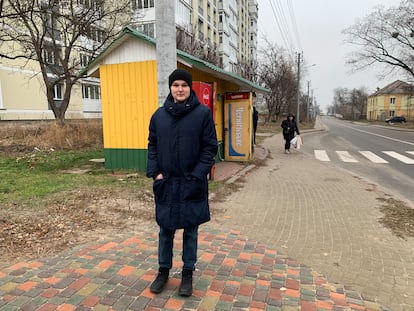
They called him in mid-April to tell him that they had found the remains of several bodies, also charred, among which his father could be found. It was not until August of this year that it was confirmed that his father was among them. There are still 63 victims who have not been identified, according to the mayor. “I had not lost hope that it wasn’t him, that he was actually somewhere else, like at the front,” the young man confesses. “I’m trying to get over it, not to think about the horror. I’m trying to be useful,” says Yevdorkymenko hastily. “I’ve worked with psychologists and I’ve understood that I have to get on with my life.”
That is what Bucha is all about: moving forward, even though it is difficult. “I am very proud of the town. We are doing very well,” says Yuliya Nichvoloda, the owner of a café that was destroyed in the bombings and rebuilt. The mother of five children, who she is trying to provide as normal a Christmas as possible, admits without hesitation: “Emotionally, it’s getting harder and harder.”
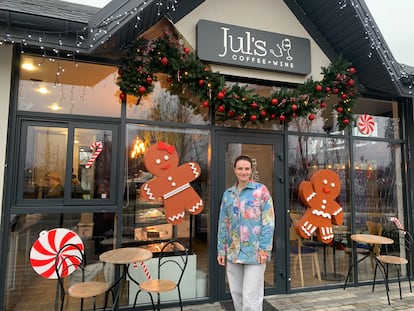
“Everyone is trying to carry on living, but it’s very tiring,” Nichvoloda says, smiling. The war is still going on, and Bucha, which is trying to overcome the trauma, lives under the constant threat of bombing, like the rest of the country. At the cemetery, the plots reserved for fallen soldiers at the front are constantly growing. Relatives of mobilized soldiers share their fears with Halavin every day. “We keep living perhaps because of the adrenaline,” says the priest, and because their existence depends on it: “We have no choice. Either we fight or we disappear.”
“I’m keeping all my feelings and emotions to myself until the day of victory,” the priest admits. “There is no doubt that we will restore Ukraine and it will be better, but our souls are wounded. We have to find a way to live and heal, and it will take a long time.” Meanwhile, Bucha is forging ahead, rebuilding a version of normality, determined not to succumb. “There are always moments for joy and Christmas is one of them. The Russians will never be able to steal that from us,” Halavin says, smiling.
Sign up for our weekly newsletter to get more English-language news coverage from EL PAÍS USA Edition
Tu suscripción se está usando en otro dispositivo
¿Quieres añadir otro usuario a tu suscripción?
Si continúas leyendo en este dispositivo, no se podrá leer en el otro.
FlechaTu suscripción se está usando en otro dispositivo y solo puedes acceder a EL PAÍS desde un dispositivo a la vez.
Si quieres compartir tu cuenta, cambia tu suscripción a la modalidad Premium, así podrás añadir otro usuario. Cada uno accederá con su propia cuenta de email, lo que os permitirá personalizar vuestra experiencia en EL PAÍS.
¿Tienes una suscripción de empresa? Accede aquí para contratar más cuentas.
En el caso de no saber quién está usando tu cuenta, te recomendamos cambiar tu contraseña aquí.
Si decides continuar compartiendo tu cuenta, este mensaje se mostrará en tu dispositivo y en el de la otra persona que está usando tu cuenta de forma indefinida, afectando a tu experiencia de lectura. Puedes consultar aquí los términos y condiciones de la suscripción digital.








































